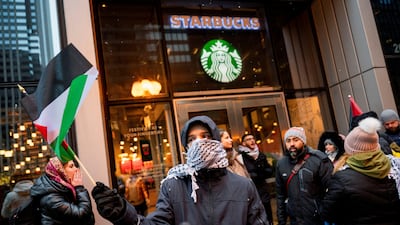Live updates: Follow the latest news on Israel-Gaza
More than one in three customers are boycotting brands over companies' perceived stances on the war in Gaza, as consumers express their politics through shopping, a global survey has shown.
The latest edition of public relations firm Edelman's annual Trust Barometer polled 15,000 consumers around the world, including in the UAE, Saudi Arabia, the UK, US and India.
In Saudi Arabia, 72 per cent of respondents are boycotting brands that they consider to be supporting a side in the Israel-Gaza war.
Fifty-seven per cent of respondents in the UAE also said they would not buy a brand because of its perceived support for a side.
US-based brands such as Starbucks, McDonald's and Coca-Cola are struggling with the effects that boycotts are having on their businesses in the Middle East.
Corporations have frequently said that they do not back a particular side in the Israel-Gaza war.
McDonald's recently reported a dent in first-quarter sales over the boycott, which it said has had its greatest effect in the Middle East.
And in March, Starbucks announced it would be laying off thousands of employees in the Middle East because of the impact boycotts over the Gaza war have had on its business.
The survey also found geopolitics is having a notable impact on brand choice. Seventy-eight per cent of customers said they will not buy from a brand because of where it is based.
Overall, 60 per cent of customers worldwide are choosing brands based on their politics, a 2 per cent increase from last year.
The report also found everyday brand actions are seen as political.
Most respondents also said trust ranks before customer service, reputation and convenience when buying a brand's product.

